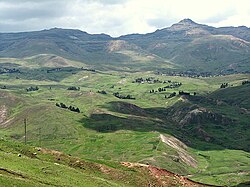Department of Huancavelica
Huancavelica
| |
|---|---|
 | |
 Location of the Department of Huancavelica in Peru | |
| Coordinates: 13°01′S 75°05′W / 13.02°S 75.09°W | |
| Country | Peru |
| Subdivisions | 7 provinces and 94 districts |
| Capital | Huancavelica |
| Government | |
| • Governor | Maciste Díaz Abad |
| Area | |
• Total | 22,131.47 km2 (8,545.01 sq mi) |
| Population (2017) | |
• Total | 347,639 |
| • Density | 16/km2 (41/sq mi) |
| UBIGEO | 09 |
| ISO 3166 code | PE-HUV |
| Website | www |



Huancavelica (Spanish pronunciation: [waŋkaβeˈlika] ) is a department and region in Peru with an area of 22,131.47 km2 (8,545.01 sq mi) and a population of 347,639 (2017 census). The capital is the city Huancavelica. The region is bordered by the departments of Lima and Ica in the west, Junín in the north, and Ayacucho in the east.
Political division
[edit]The department is divided into seven provinces.
Province (Capital)
- Acobamba Province (Acobamba)
- Angaraes Province (Lircay)
- Castrovirreyna Province (Castrovirreyna)
- Churcampa Province (Churcampa)
- Huancavelica Province (Huancavelica)
- Huaytará Province (Huaytará)
- Tayacaja Province (Pampas)
The main cities are Huancavelica, Pampas and Lircay. There are many little districts like Querco in Huancavelica. Querco is a nice little town. Most of the residents are agricultors. They own cattle, sheep, pigs, horses, mules, llamas, goats, chickens, and donkeys.
Demographics
[edit]The region is mostly inhabited by indigenous people of Quechua descent.
Languages
[edit]According to the 2007 Peru Census, the language learnt first by most of the residents was Quechua (64.03%) followed by Spanish (35.67%). The Quechua variety spoken in Huancavelica is Chanka Quechua. The following table shows the results concerning the language learnt first in the department of Huancavelica by province:[1]
| Province | Quechua | Aymara | Asháninka | Another native language | Spanish | Foreign language | Deaf or mute | Total |
|---|---|---|---|---|---|---|---|---|
| Acobamba | 51,338 | 49 | 11 | 10 | 8,261 | - | 78 | 59,747 |
| Angaraes | 40,669 | 62 | 7 | 7 | 10,922 | - | 56 | 51,723 |
| Castrovirreyna | 4,093 | 14 | 1 | 3 | 14,168 | - | 73 | 18,352 |
| Churcampa | 33,025 | 27 | 4 | 19 | 8,542 | 3 | 127 | 41,747 |
| Huancavelica | 73,340 | 117 | 28 | 13 | 59,544 | 4 | 157 | 133,203 |
| Huaytara | 5,670 | 13 | 4 | 3 | 16,218 | 2 | 28 | 21,938 |
| Tayacaja | 63,950 | 91 | 23 | 15 | 33,900 | 1 | 242 | 98,222 |
| Total | 272,085 | 373 | 78 | 70 | 151,555 | 10 | 761 | 424,932 |
| % | 64.03 | 0.09 | 0.02 | 0.02 | 35.67 | 0.00 | 0.18 | 100.00 |
Education
[edit]The National University of Huancavelica is the only university in the region and it has branches in Pampas, Lircay, Acobamba and Castrovirreyna.
Health
[edit]The region has two hospitals located in Huancavelica and Pampas. There are clinics and medical post in most of the towns.[citation needed]
Transportation
[edit]The region is connected with the neighboring regions by national roads, which are paved in most cases. There are regional and local roads that are serving the towns of the regions. Huancavelica has a train service with the city of Huancayo.
Notable natives
[edit]- Lina Medina, world's youngest mother
Authorities
[edit]- Governor: Rubén Alva Ochoa (2015–2018)
See also
[edit]Sources
[edit]- ^ inei.gob.pe Archived 2013-01-27 at the Wayback Machine INEI, Peru, Censos Nacionales 2007
External links
[edit]


